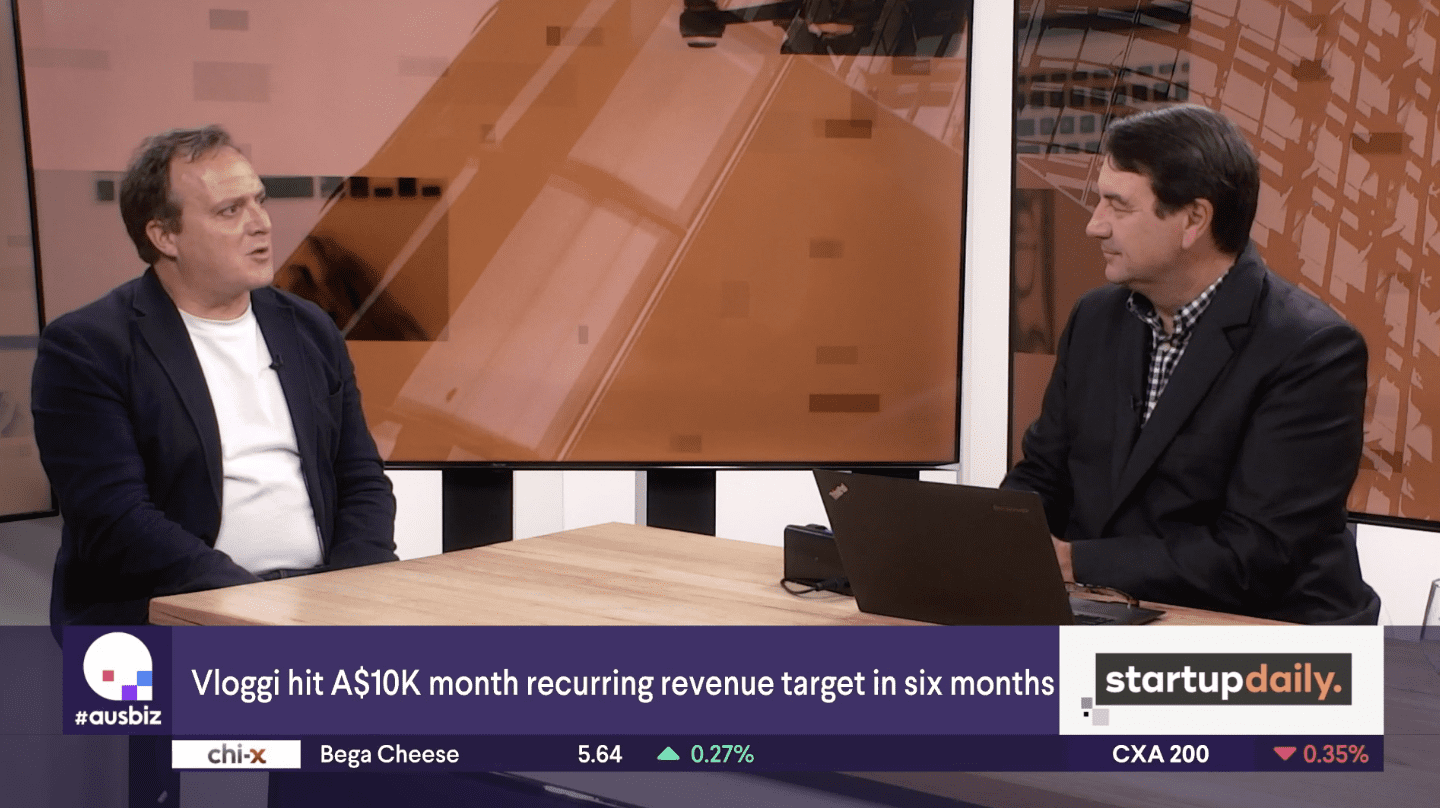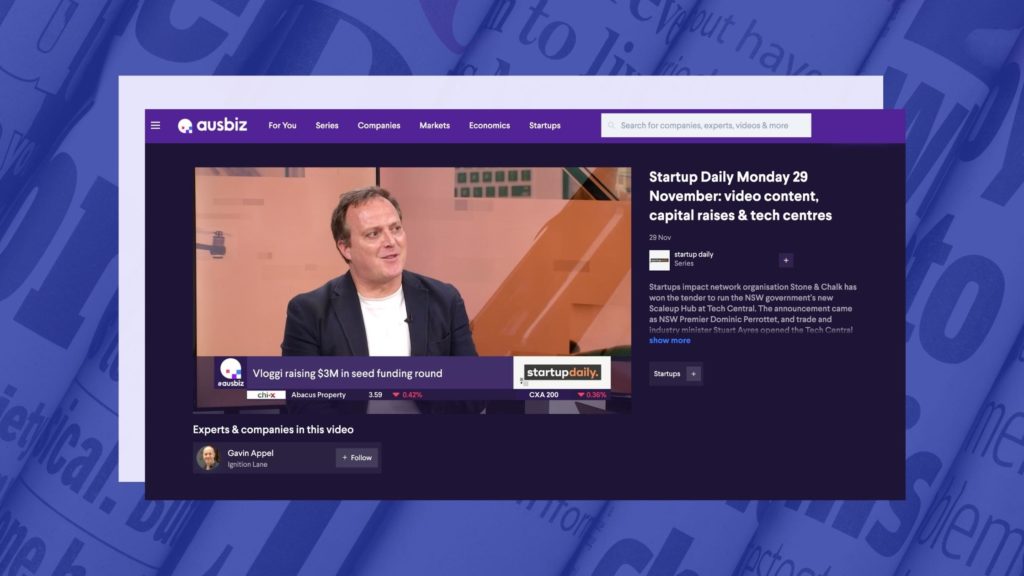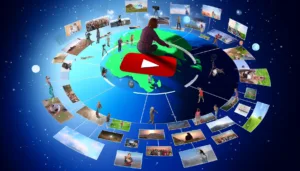On 28 November 2021 Simon Thomsen interviewed Justin Wastnage, founder of asynchronous video platform Vloggi on the expansion of the company's seed raise internationally.
Australian video scale-up Vloggi expands seed round to international investors as it looks to complete a $3 million capital raise. The company hit $10K month recurring revenue six months ahead of schedule with founder Justin Wastnage joining us to tell us more. Click below to play the episode on ausbiz.com.au.

Watch the episode here on the ausbiz channel (Watch from 30:00)
Simon Thomsen
"All right, now to our final guest, Australian video scale up, Vloggi, has expanded its $3 million seed round to international investors.
This follows the successful completion of a pre-seed round of $750,000.
And to tell us more about the company's plans, founder, Justin Wastnage joins us in the studio.
Justin, great to have you back in."
Justin Wastnage:
"Thank you."
Simon Thomsen:
"Tell us about this raise. You've decided to put a little bit more in, but why are you looking
internationally for the cash, is the US dollars worth more than Australian?"
Justin Wastnage:
"Yeah, it's a little bit of that.
So I think actually the last time I was on the show, when we finished the $750,000 raise, you said, 'oh, you'll be doing a seed round almost straight away, and, you know, had it not been for lockdown, we would have gone straight away.
And I guess really, so we've put two things out in the market.
We put, first of all, a $1 million SAFE note, which is targeted at angel investors.
And then we know that next year we'll need to follow it up with a further $2 million, so $3 million total.
And I guess why are we going international is because really this concept of a SAFE note is really much more understood.
So we've actually had lots of people internationally, mainly from Asia, understanding that concept of SAFE note.
But even today I was talking to an Australian investor this morning and he was like, "Okay, so let me get this straight. Why wouldn't I just get priced equity?" And we said, "Well, because you're going to get 20% discount. You're going to get for every $3 you put in now, you're going to get shares worth $7.40 in two years time if we hit our milestones," and he just couldn't get it.
So really that's really the reason why we've gone international.
Simon Thomsen:
"It's kind of also fascinating given the conversation we were having earlier in the show with Matt Allen, where of course he's doing venture debt for startups. And so there are all these different models around how to fund, but I do want to get a picture of the company at this point in time.
How are you tracking on your build? How's your revenue going? Where is Vloggi sitting at this point in time?"
Justin Wastnage:
"Sure, so I think when we spoke last time, we actually had seven paying customers and that was back in May. And that's when we really launched the self service SAAS product.
Now we've got 590 customers and our MRR is sitting at $11,500 per month, that's undiscounted. So we have had to apply discount to some of those customers to bring them on board, but we're really happy with that growth.
And when we put a lot of money in during lockdown, into advertising, we knew that we were basically getting 400 or 500 visitors to our site a month and we're converting about 12% of them down the end of the funnel. So we kind of know the
marketing's working.
We know the product works, we had a big group Avon, the cosmetic company in Italy use us and they had 650 people
uploading videos simultaneously into our platform and it could handle it.
We've now got some bigger name clients here in Australia, like MYOB, Dale Carnegie in the US and actually, this is the other reason why we've decided to go international in seeking the funds is that about 75% of our customers come from overseas and we don't actively target them, but this is a collecting video, which is our core product.
And then making it easy to use those videos. That is a need felt by people overseas intensely.
So Avon, they said 'we've never found a tool like yours' and they're from Italy, they found us in Australia. Dale Carnegie, same.
And we have politicians using us in the US and in Canada and in the UK, we have actually signed up a political party here in Australia ahead of the federal election. I can't tell you which one."
Simon Thomsen:
"I'm sure we'll find out soon enough."
Justin Wastnage:
"Well, no, you probably won't because actually one of the beauties of our platform is everything's private.
So it's not a social media. It's just a way for organizations to collect video from their community, their customers, or their colleagues at vast scale, and then for them to use however they want."
Simon Thomsen:
"So let's take us through this because you say you're an asynchronous video messaging platform.
What does that mean, because it kind of sounds almost like a quantum computing thing?"
Justin Wastnage:
"Well, but again, overseas people get these terms, right? So asynchronous video really means that people can record it in their own time. So to give an example of how it's been used in the business context, sales meetings, rather than people being on Zoom calls where they're part of the conversation is probably only one minute or two minutes, they can actually record that ahead of time at a time that suits them.
And then our system pulls that together into like a 10-minute sales update with all the people's updates all there combined.
So what asynchronous means in that sense is, and this is really the, one of the biggest trends that's going to take place in this decade. It's already growing 12% year on year, is this use of video messaging, and that's fine.
And you can do one-to-one video messaging with Slack and all the other on WhatsApp. But imagine if you wanted to make a compilation video from WhatsApp group, you can't currently without downloading and reuploading it. That's what we do.
But also we catalog all the clips coming in. So that actually businesses can actually really work out which clips to source and then automate that production"
Simon Thomsen:
"So could I describe you as the video solution for the tech job generation?
'Cause you sort of seem to be able to sort of stitch this together to create the blanket out of all of this patch work.
Justin Wastnage:
"Yeah, so people have called us TikTok for business, but for example, we're talking to one of the big supermarket chains through their agency about doing hyper-local video marketing, where customers of the local branch would be encouraged to upload videos about their experience, good or bad.
The manager of that store could make videos, video compilations from that store, but their head office has
access to thousands or millions of video clips, which are all tagged. So they can make marketing very quickly from all that content or use it for market research.
We're talking to a large company based out of Switzerland that doesn't ever publicize its name, and they want to use this
for internal market research. So this whole idea about private, a private social media is quite appealing to people because whenever people upload their videos through our system all the consent is granted and all the rights, now companies can go and use that for marketing.
And that's kind of where we started when we first launched the self-service tool with JAX Tyres and Auto using for marketing. But what we're seeing increasingly is businesses or political groups or those sorts of people using it for internal marketing, capturing voices, gathering voices, capturing people's views, and then stitch them together using some of the logic into this is two minutes of what people think about animal cruelty, that kind of thing."
Simon Thomsen:
"Okay, so let's say $3 million roaring success, absolutely nail it, tell us about the plans for the cash?"
Justin Wastnage:
"So basically we know we need to spend at least 40% of it on sales and marketing. Â So because the problem that we're solving isn't yet one understood, there's a lot of work there. We know how to do that through the funnel. We're also developing some
of the tech deep down.
So I think I was saying to you, there's kind of three components to our platform:
- Making collecting video easy, that we've nailed, and that works perfectly.
- But in that cataloging of the videos; we get about 32 data points from every video clip currently, we think we can increase that to about 52 using AI. And that is the information that actually is there to present it to the customer so they can actually make use of the video clips. And that's some deep tech work needs to be done there.
- But then in that combining, that already exist in our platform, but we can make it a whole lot better.
So there's a lot of money needs to spend in UX because it's, you know, it's still probably a little bit too clunky. So there's another 33% of the budget to be spent on that.
And then the rest admin and moving to the ScaleUp hub perhaps, or whatever."
Simon Thomsen:
"Yeah, at least I know you're at Fishburners."
Justin Wastnage:
"We love Fishburners."
Simon Thomsen:
"Before we wrap, I do want to ask, what have you learnt out of this? I think you identified some of it along the way when you just have things like the UX is a little bit clunky, you want to fix that up. What have been your biggest lessons out of building this business in this initial phase?"
Justin Wastnage:
"I'll tell you the biggest thing. So we actually hired a CFO about four or five months ago to really work on the projections going forward. And what we really identified there was building a self service platform and marketing it is really, really expensive. So we've actually discovered, so for example, we have an app, a mini version of our platform going live on SEMrush App Center tomorrow.
And when we studied the economics, so we've seen actually distributed partnerships, is a no brainer. You know, you lose 30% or so, but that's all sales and marketing. So that's a sales and marketing cost that you can predict. And all the revenue you get is free of the variations of sales marketing.
And also the other thing we realized when we said we have MYOB as a customer. And what we've realized now is that the larger corporates and we're talking to a corporate that wants 7,000 or 8,000 licenses of the software. Now, that single sale alone
won't pay back the millions, but it almost, you know, like, so once we got our head around, actually yes, we can build a self-service tool over here. But the real money is in making a tool that is suitable for corporates to use across their business.
And then how we get the low value, high volume stuff is by all these partnerships, there's 7,500 app stores in the world.
If you think about, if you think about Xero and MYOB, they have their own app stores, the WordPress plugin center, you name it, Salesforce, HubSpot, they all have app stores.
So actually what we've learnt is we can make a mini version of our platform for those and we can target every vertical that way, rather than us having to spend our marketing dollars."
Simon Thomsen:
"Oh, what a fascinating insight there, Justin, thank you so much for joining us from Vloggi, all the best with the raise.
Of course, we will have the details on startupdaily.net for people to read a little bit more.
Thanks for your time."
Justin Wastnage:
"Thank you."
Simon Thomsen:
"All right, and that is it for today, Monday over already, but we hope you've had a great time on the Startup Daily show today.
Of course, as I mentioned, you can head to the site for more startupdaily.net and feel free to follow us on Twitter at startupdailyANZ.
The Trade with Kara is up next before the rest of the AusBiz team returns to follow the rest of today's market.
You have a great afternoon. We'll see you Tuesday at 2:00 PM for the last day of the month, bye for now."





